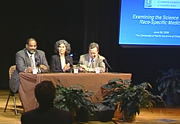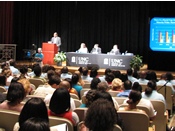- When is the Videoconference? Tuesday, June 9, 2009, 1:30pm - 4:00pm EDT. (Note the earlier start time than in recent years.)
- Where can I participate? In person at the Tate-Turner-Kuralt auditorium in the UNC School of Social Work
(SSW), via Internet or C-band satellite (funding for the satellite broadcast is being sought)
- Is there a charge? There is no charge to participate at the TTK auditorium, at most viewing sites, or for the webcast. Viewing sites that charge a registration fee are asked to indicate that in the list of sites.
- Where can I find information about participating on-site (at the TTK auditorium)? Information can be found at this webpage.
- How do I register to participate? There are on-line registration forms to participate in the studio audience at TTK auditorium or via webcast. To register a site for a group to participate in the broadcast, please see the broadcast page..
- What kind of satellite receiver do I need? If we obtain sufficient funding we will broadcast on c-band. We purchase limited technical support from the satellite vendor. Please stay tuned.
- How do I register a satellite downlink or group viewing site? Information can be found at the broadcast page.
- How do I get the satellite coordinates? Satellite coordinates become available to us about 2 weeks before the broadcast. We send them to early registrants at the email addresses you provide through the registration form. Thereafter the coordinates are displayed at the end of the site registration procedure.
- Where can I receive the broadcast? The webcast should be available from any Internet connection (broadband is recommended). The satellite broadcast covers, approximately, the continental U.S. When the specific satellite is known we can provide a link to the coverage map.
- Are there any requirements? Group viewing sites are requested to (1) inform us whether they did in fact receive the program, encountered any problems, and recorded the session, (2) tell us the number of participants at their site (site facilitator evaluation form) and (3) send a completed attendance sheet. We ask all participants to complete the participant evaluation form. We need this information to evaluate the broadcast and make our case for continued funding.
- May we record the broadcast? The site agreemeent specifically permits registered sites to make a copy of the broadcast for use in their institution, including library use and internal rebroadcast. We have in the past been able to give permission for other uses, so please feel free to ask about rebroadcasts.
- Will there be any materials? We will post materials online and announce their availability to registered participants. We do not usually receive presenters’ Powerpoint slides until several days before the event. We will post presentation abstracts and citations as soon as we receive them.
- Why have the Gillings School of Global Public Health and its partners been committed to making this conference happen for the past 14 years?
The Videoconference is one demonstration of the School’s commitment to advancing public health in the area of health disparities, which over the course of these years has been officially recognized as a national priority (the second listed goal in Healthy People 2010, the nation’s health promotion planning documents. When the Annual Institute (the forerunner to the Videoconference) began in 1995, it was one of very few (or the only) nationally-available training activities on conducting research on health disparities, and over the next five years became the largest national educational program on that topic. More details about the history of the Institute and Videoconference are available.
- How does this conference relate to other efforts of the Minority Health Project and the Gillings School of Global Public Health?
The Annual Videoconference is one of three major activities of the Minority Health Project. The second is the broadcast of the Annual William T. Small, Jr. Keynote Lecture from the Minority Student Caucus-led Annual Minority Health Conference, each February. The third activity is our website, which serves to publicize these events and to provide a single location where you can find out about all minority health-related activities at UNC.
- What has been the impact of past conferences?
The Videoconference has drawn a large, national audience (hundreds of participants/broadcast, often over 100 satellite or Internet downlink sites) and is a significant national event for health disparities researchers and students. (See comments from past participants). The presentations inform and inspire. Thousands of people have visited our archived webcasts.
- What can participants (in person and remotely) expect from the conference experience?
Participants receive an up-to-date conceptual framework for understanding the relation of how health disparities promote educational inequities and vice-versa, presented by leaders in the field. The framework will be relevant both for the groups with lower educational achievement and poorer health as well as for others. The Videoconference also provides inspiration and role models for young people wondering how they can contribute to improving society. The Videoconference will be attended by several programs designed to facilitate the entrance of young people into health careers, such as the NC Health Careers Access Program (NC-HCAP).
- Who will find the issues/approach/insights offered by this event to be especially relevant to their work/concerns?
People conducting research and/or involved in education in public health, psychology, sociology, health economics, and policy; people in upper-level administrative positions in academia, health care organizations, and government.
- What level/type of student, educators and public health workers will be most interested in the content of this conference? What members of the general public might be especially interested?
The topic and its treatment should be of broad interest, since it will not be regionally or occupationally defined and will address specific issues relevant to at least several major ethnic groups. Graduate students and advanced undergraduate students will be more able to understand some of the material, but there should be plenty to interest high school students as well.
- Can I obtain continuing education credits?
We regret that we do not have the staff resources to make arrangements for continuing education certifications. Sometimes participants can find an organization willing to grant credits (for a fee) to participants in this Videoconference.
- Can I obtain a DVD?
DVDs or VHS tapes of many of our programs are distributed by the Public Health Foundation (click “minority health” If a registered viewing site is unable to view the program or if someone wishes to show the program to a class or other group, we are usually able to send a complimentary DVD of the program.
- How can I find out more about the Videoconference or the Minority Health Project?
More information about the Annual Videoconference and the Minority Health Project are available at these webpages. For other information, please write to Minority_Health@unc.edu or vjs@unc.edu.
- I sent an email to Minority_Health@unc.edu and have not received a reply.
Most email addresses on the web receive hundreds of spam emails every week, so all incoming messages are filtered. Please use an informative subject line, and if your email has not been acknowledged within a few days, please feel free to telephone the webmaster (please see below).
|
|






![]() Return to the Minority Health Project home page
Return to the Minority Health Project home page